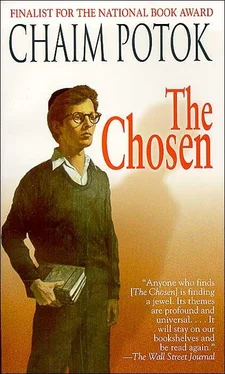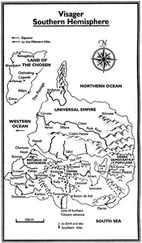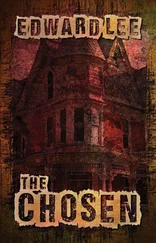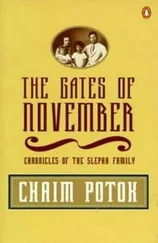He stopped. A sigh came from his lips, a long, trembling sigh like a moan. Then he looked at me, his eyes ~oist with his own suffering. 'Reuven, you and your father were a blessing to me. The Master of the Universe sent you to my son. He sent you when my son was ready to rebel. He sent you to listen to my son's words. He sent you to be my closed eyes and my sealed ears. I looked at your soul, Reuven, not your mind. In your father's writings I looked at his soul, not his mind. If you had not found the gematiiya mistake, Reuven, it would have made a difference? No. The gematriya mistake only told me you had a good mind. But your soul I knew already. I knew it when my Daniel came home and told me he wanted to be your friend. Ah, you should have seen his eyes that day. You should have heard his voice. What an effort it was for him to talk to me. But he talked. I knew your soul, Reuven,' before I knew your mind or your face. A thousand times I have thanked the Master of the Universe that He sent you and your father to my son.
'You think I was cruel? Yes, I see from your eyes that you think I was cruel to my Daniel. Perhaps. But he has learned. Let my Daniel become a psychologist. I know he wishes to become a psychologist. I do not see his books? I did not see the letters from the universities? I do not see his eyes? I do not hear his soul crying? Of course I know. For a long time I have known. Let my Daniel become a psychologist. I have no more fear now. All his life he will be a tzaddik. He will be a tzaddik for the world. And the world needs a tzaddik.'
Reb Saunders stopped and looked slowly over at his son. Danny still sat with his hand over his eyes, his shoulders trembling. Reb Saunders looked at his son a long time. I had the feeling he was preparing himself for some gigantic effort, one that would completely drain what little strength he had left.
Then he spoke his son's name. There was silence.
Reb Saunders spoke his son's name again. Danny took his hand away from his eyes and looked at his father.
'Daniel,' Reb Saunders said, speaking almost in a whisper, 'when you go away to study, you will shave off your beard and earlocks?'
Danny stared at his father. His eyes were wet. He nodded his head slowly.
Reb Saunders looked at him. 'You will remain an observer of the Commandments?' he asked softly.
Danny nodded again.
Reb Saunders sat back slowly in his chair. And from his lips came a soft, tremulous sigh. He was silent for a moment, his eyes wide, dark, brooding, gazing upon his son. He nodded his head once, as if in final acknowledgement of his tortured victory.
Then he looked back at me, and his voice was gentle as he spoke. 'Reuven, I – I ask you to forgive me… my anger… at your father's Zionism. I read his speech… I – I found my own meaning for my… brother's death… for the death of the six million. I found it in God's will… which I did not presume to understand. I did not – I did not find it in a Jewish state that does not follow God and His Torah. My brother… the others… they could not – they could not have died for such a state. Forgive me… your father… it was too much… too much -'
His voice broke. He held himself tightly. His beard moved faintly with the trembling of his lips.
'Daniel,' he said brokenly. 'Forgive me… for everything. I have done. A – a wiser father… may have done differently. I am not… wise.'
He rose slowly, painfully, to his feet. 'Today is the – the Festival of Freedom.' There was a soft hint of bitterness in his voice. 'Today my Daniel is free… II must go… I am very tired… I must lie down.
He walked heavily out of the room, his shoulders stooped, his face old and torn with pain.
The door closed with a soft click.
Then I sat and listened to Danny cry. He held his face in his hands, and his sobs tore apart the silence of the room and racked his body. I went over to him and put my hand on his shoulder and felt him trembling and crying. And then I was crying too, crying with Danny, silently, for his pain and for the years of his suffering, knowing that I loved him, and not knowing whether I hated or loved the long, anguished years of his life. He cried for a long time, and I left him in the chair and went to the window and listened to his sobs. The sun was low over the brownstones on the other side of the yard, and an ailanthus stood silhouetted against its golden rim, its budding branches forming a lace curtain through which a wind moved softly. I watched the sun set. The evening spread itself slowly across the sky.
Later, we walked through the streets. We walked for hours, saying nothing, and occasionally I saw him rub his eyes and heard him sigh. We walked past our synagogue, past the shops and houses, past the library where we had sat and read, walking in silence and saying more with that silence than with a lifetime of words. Late, late that night I left Danny at his home and returned alone to the apartment.
My father was in the kitchen and there was a strange brooding sadness on his face. I sat down and he looked at me, his eyes somber behind their steel-rimmed spectacles. And I told him, everything.
When I was done, he was quiet for a very long time. Then he said softly, 'A father has a right to raise his son in his own way, Reuven.'
'In that way, abba?'
'Yes. Though I do not care for it at all.'
'What kind of way is that to raise a son?'
'It is, perhaps, the only way to raise a tzaddik.'
'I'm glad I wasn't raised that way.'
'Reuven,' my father said softly, 'I did not have to raise you that way. I am not a tzaddik.'
During the Morning Service on the first Shabbat in June, Reb Saunders announced to the congregation his son's intention to study psychology. The announcement was greeted with shocked dismay. Danny was in the synagogue at the time, and all eyes turned to stare at him in astonishment. Whereupon Reb Saunders further stated that this was his son's wish, that he, as a father, respected his son's soul and mind – in that order, according to what Danny later told me – that his son had every intention of remaining an observer of the Commandments, and that, therefore, he felt compelled to give his son his blessing. The turmoil among Reb Saunders' followers that was caused by this announcement was considerable. But no one dared to challenge Reb Saunders' tacit transference of power to his younger son. After all, the tzaddikate was inherited, and the charisma went automatically from father to son – all sons.
Two days later, Reb Saunders withdrew his promise to the family of the girl Danny was supposed to marry. There had been some fuss over that, Danny told me afterward. But it had quieted down after a while.
The reaction at Hirsch College, once the news of Reb Saunders' announcement was out, lasted all of about two or three days. The non-Hasidic talked about it for a day or so, and then forgot it. The Hasidic students sulked, scowled, glowered, and then forgot it, too. Everyone was busy with final examinations.
That June Danny and I were among the seventy-eight students who were graduated from Hirsch College, to the accompaniment of numerous speeches, applause, honorary degrees, and family congratulations. Both of us had earned our degrees summa cum laude!
Danny came over to our apartment one evening in September.
He was moving into a room he had rented near Columbia, he said, and he wanted to say good-bye. His beard and earlocks were gone, and his face looked pale. But there was a light in his eyes that was almost blinding.
My father smiled at him warmly. 'Columbia is not so far,' he said. 'We will see you on Shabbat.'
Danny nodded, his eyes glowing, luminous.
I asked him how his father had reacted when he had seen him without the beard and earlocks.
He smiled sadly. 'He's not happy about it. He said he almost doesn't recognize me.'
Читать дальше












